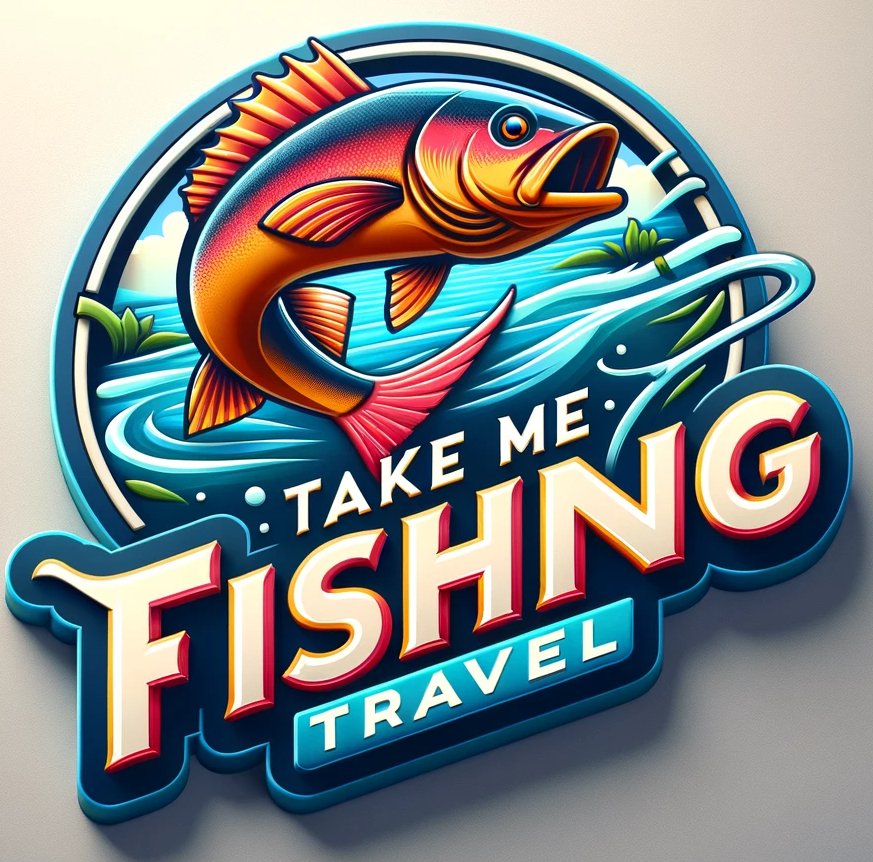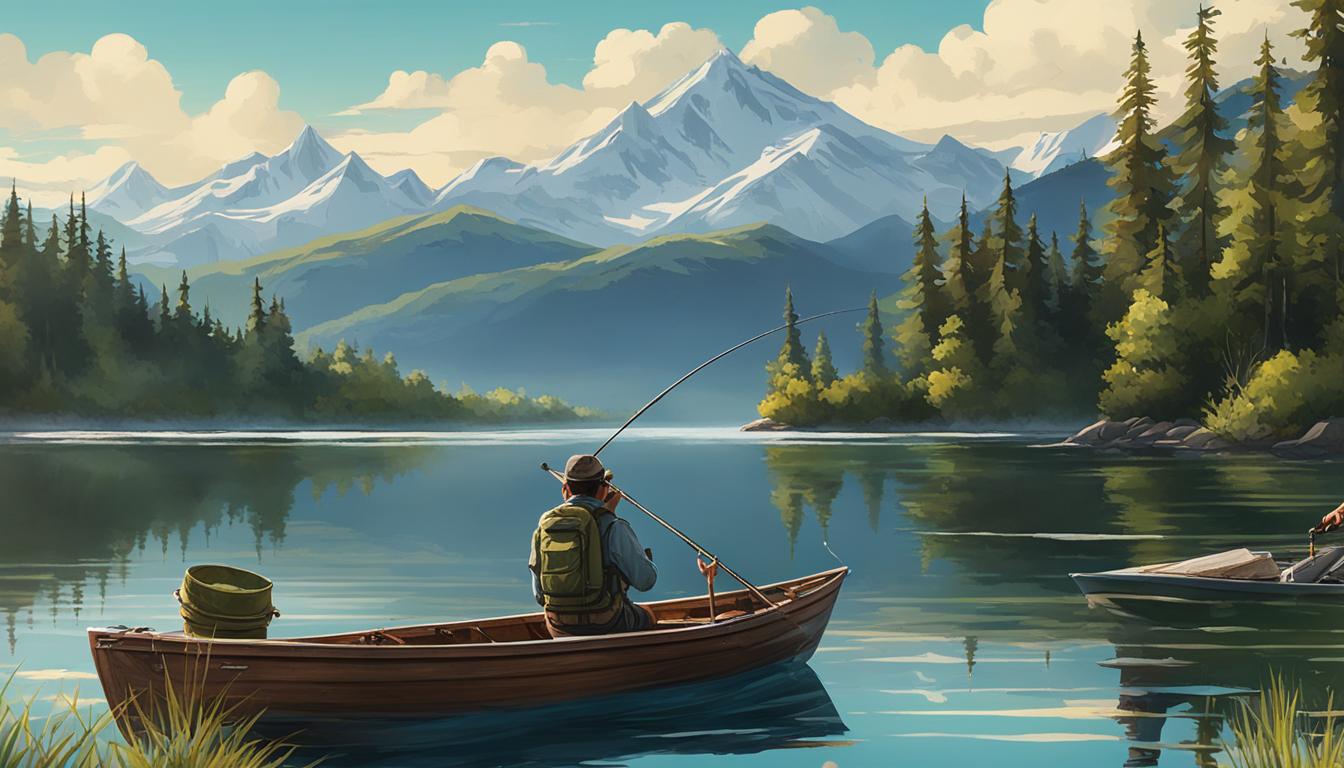“As an Amazon Associate I earn from qualifying purchases.”
Essential Fishing Travel Planning Tips: Ensure a Successful Trip starts with meticulous planning. Fishing travel planning tips can turn the prospect of fishing the Frying Pan in Colorado or remote locations like the headwaters of the San Juan River into a reality teeming with trophy catches. Your enthusiasm for how to plan a fishing trip is understandable, and ensuring you’re well-prepared is key to a successful and enjoyable outing. Detailed preparation is a hallmark of a seasoned angler—a trait that sets the stage for those unforgettable stories of ‘the one that didn’t get away.’
Fishing trip tips extend beyond just knowing where the fish are biting. They encompass a deep dive into local fishing regulations, climate considerations, and even tackling the art of tying the right flies. And for you, the dedicated travel tips for fishing enthusiasts, this process is not just a requirement—it’s part of the fun. The way you spend your off-season, poring over resources and hatch charts, ensures that by the time you’re wading into those waters, you’re as ready as can be.
Key Takeaways
- Initiate your fishing trip with comprehensive destination research—know before you go.
- Familiarize yourself with the local fishing regulations and access laws to avoid any legal snags.
- Investigate the climate and seasonal fisheries to ensure optimal timing for your trip.
- Select the appropriate gear and flies based on regional hatch charts and expert insight.
- Embrace the pre-trip planning phase to maintain excitement and engagement year-round.
- Utilize online resources and tools for up-to-date information on stream conditions and wildlife activity.
Setting the Stage for Your Fishing Adventure
Embarking on a fishing trip is an exciting endeavor, requiring thoughtful preparation to ensure a memorable and successful experience. Whether you’re planning to explore the quiet streams of Montana or the vast lake systems of Minnesota, fishing vacation planning is your ticket to an unforgettable escapade. Let’s dive into the essentials that will lay the groundwork for your angling journey.
Importance of Detailed Research
Investing time in comprehensive research is a must for setting expectations and achieving a fruitful fishing trip. Books, maps, and digital resources arm you with the knowledge needed to tackle unfamiliar fisheries and predict likely hatches and their timings. This groundwork is crucial in turning a good fishing trip into the best destination for fishing trips in your personal logbook.
Seasonal Considerations for Destination Selection
Picking the right time to visit your chosen destination isn’t just about scheduling—it’s about optimizing your chances for success. Various factors like water temperature and stream conditions play a pivotal role. By aligning your trip with the most favorable conditions, your prospects of landing the big one can dramatically increase.
Maximizing Off-Season Planning for Anglers
When the fishing season fades, that’s your cue to begin the behind-the-scenes work. Planning a successful fishing trip during the off-season gives you ample time to prepare materials, fill your fly boxes, and strategize. Embrace the quieter months as an opportunity to build anticipation and readiness for your upcoming aquatic adventure.
Now that you have a sense of the importance of diligent preparation, think of the off-season as your prelude to adventure. As the next fishing season approaches, you’ll find yourself ready and equipped for the expedition that awaits, thanks to your meticulous planning and anticipation.
Understanding Local Fishing Regulations and Access Laws
Before you set out on your next fishing excursion, it’s paramount to familiarize yourself with the fishing regulations and access laws of your destination. Knowledge of these rules is the key to a trip that is both legal and enjoyable. Local laws significantly vary and understanding the nuances between public and private waters can save you from potential legal dilemmas. Equip yourself with the fishing gear essentials and fishing travel essentials suitable for the regulations of the region.
Navigating Public vs. Private Water
As an angler, it’s essential to respect property rights while searching for the perfect fishing spot. Consider the distinction between public domains, which are generally accessible, and private streams that may require permission or even be off-limits. This understanding is critical, especially in heavily regulated states where trespassing fines are stringent.
Utilizing Resources like State’s Fisheries Agency Websites
Official resources such as state fisheries websites should be your go-to for accurate and comprehensive information. For instance, Colorado’s state agency provides extensive resources, including interactive Fishing Atlases, which are crucial when planning your visit to trout streams. These tools can clarify the legal complexity of waterway access and help ensure you’re in compliance with local fishing laws.
Leveraging Online Tools for Stream Access Points
Advanced online tools, like TroutRoutes, are beneficial for uncovering stream access points. A subscription to these services grants you the convenience of precision when it comes to locating legal fishing spots. Utilizing these digital resources can significantly ease the planning phase of your trip, allowing you more time to enjoy the experience itself.
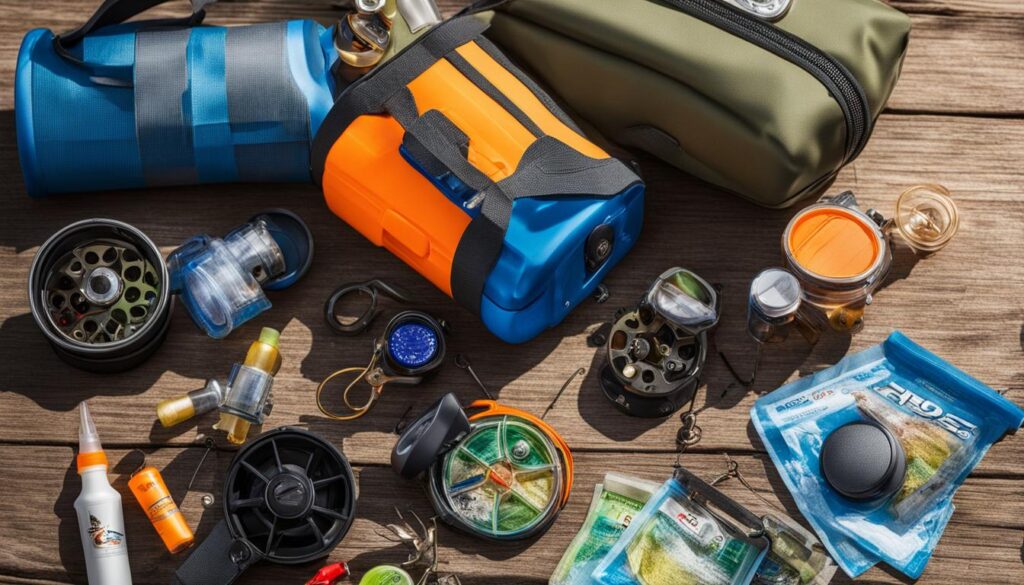
Choosing the Right Gear for the Trip
Embarking on a fishing expedition requires not just a passion for the sport, but also careful preparation to ensure your time at the water’s edge is both enjoyable and fruitful. Whether you’re casting lines in the serene Arkansas tailwaters or exploring the rich diversity of fisheries in the American Southwest, possessing the appropriate fishing gear essentials will place you in good stead for making those memorable catches.
Fishing Gear Essentials for Diverse Environments
Your gear collection needs to be as versatile as the environments you tackle. Crisp, clear mountain rivers might call for light tackle while brackish coastal marshes demand more robust equipment. Doing your homework on the best destinations for fishing trips can give you a grasp on what to expect and how to gear up effectively. Let’s delve into the key items you’ll need for a variety of settings. But remember, the following table is just the beginning; local conditions may demand specific additions or subtractions.
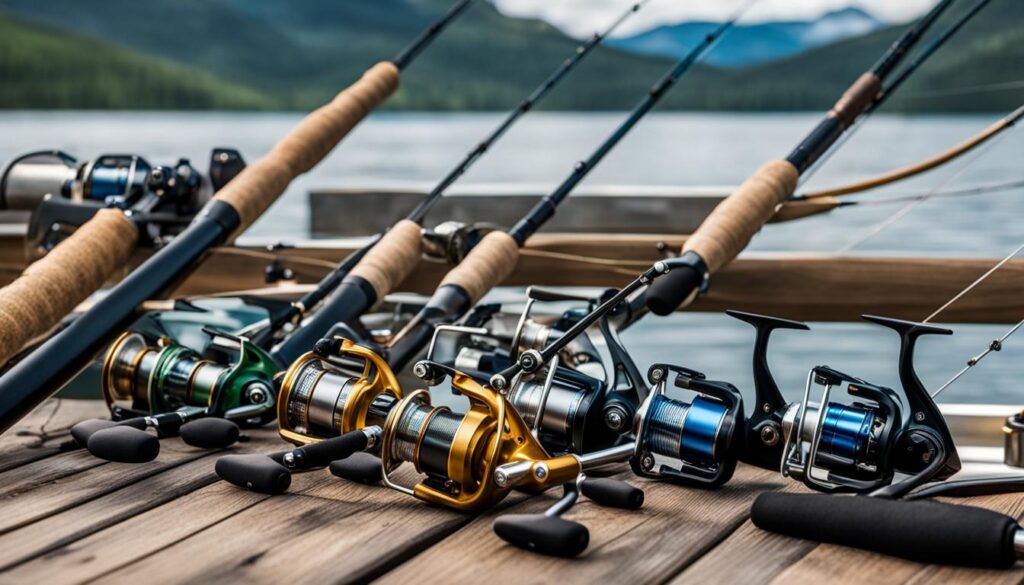
| Environment | Rod | Reel | Line | Lure/Bait | Additional Gear |
|---|---|---|---|---|---|
| Mountain Rivers | Lightweight fly rod | Fly reel with good drag | Floating line | Flies matching local hatches | Waders, landing net |
| Coastal Marshes | Medium-heavy spinning rod | Corrosion-resistant spinning reel | Braided for sensitivity | Topwater lures, soft plastics | Waterproof gear bag, pliers |
| Deep Lakes | Heavy casting rod | Larger baitcasting reel | Heavier monofilament or fluorocarbon | Deep-diving crankbaits, jigs | Boat or kayak, fish finder |
Adapting Your Tackle to Expected Fish Species and Hatches
While general essentials are a must, planning a successful fishing trip often boils down to the minor specifics. Adjusting your tackle based on the anticipated fish species and expected hatches can increase your chances of success. Local bait shops can be gold mines of information; a brief conversation with the staff could lead you to select the perfect lure for the local bass population or the preferred fly for those picky trouts. Pay heed to their advice, they’re the gateway to understanding the subtle intricacies of the local fishing scene.
Efficient Packing Tips for Traveling Anglers
The way you pack can greatly influence your fishing experience. Efficiency is your ally, especially when facing strict travel restrictions. For example, if traveling by bush planes or helicopters, knowing how to pack your rods and reels compactly while keeping within weight limits can make or break your trip. Consider multi-use items such as jackets that double up as flotation devices, or collapsible water containers. And always, safety gear and personal medication should be top of your packing list, for they’re not just essential; they’re lifesavers on any fishing trip.
Ultimately, familiarity breeds success. Knowing your gear’s ins and outs, from the casting weight of your rods to the drag setting on your reels, brings not just confidence but also peace of mind. So when you step out into the great fishing destinations waiting for you, it’s not just the fish that will be taking the bait, but also the lure of the adventure itself.
Fishing Travel Planning Tips – Where and When to Go
Embarking on a fishing adventure can be the highlight of your year, but the successful orchestration of your trip hinges on meticulous fishing trips planning. The quest for the reel-breaking catch starts with pinpointing the best destinations for fishing trips, allowing you to immerse in the most fertile waters the world has to offer. Let’s dive into deciding the prime locales and times that will shape your angling escapades.
You might be tethered to specific geographies due to work engagements – for instance, Denver. Yet, this offers a silver lining. The South Platte or the majestic Colorado River are teeming with opportunities, especially if you harness local wisdom. Reach out to area guides; their personalized insights can be game-changing. Your fishing travel planning tips should include conversing with these experts who can not only guide you to the best fishing spots but also advise on optimal fishing practices for the area.
Travel not only for the catch but for the serenity of nature, the pulse of the river, and the dance of the fly on the water. The journey, in the pursuit of fishing, is often as rewarding as the thrill of the catch itself.
Let’s not overlook the allure of casting your line in foreign waters – perhaps the bountiful rivers of Sitka, Alaska, or the enchanting streams of New Zealand’s South Island. When planning these international quests, ensure you scrutinize generation schedules, median stream flows, and the seasonal nuances key to making the most of your trip.
Here’s a table summarizing factors to consider when scheduling your fishing trips:
| Location | Season | Optimal Conditions | Local Industry Peaks |
|---|---|---|---|
| Denver, Colorado | Spring-Fall | Lower stream flows, active fish | Summer tourism, prepare for crowds |
| Sitka, Alaska | Mid June – September | Salmon runs, less precipitation | Fishing peak, book accommodations early |
| South Island, New Zealand | October – April | Stable weather, active trout | Summer tourism, plan for competition on the water |
Remember to be mindful of the local economies – identifying tourist seasons and peak fishing times will help you make the most out of your efforts while respecting local practices and ensuring sustainability for future visits.
Your journey to waters near or far, brimming with game or still uncharted, begins with a single step – or cast. Plan wisely, choose with insight, and wherever your fishing travels may take you, may your lines be tight and your spirits high.
Connect with Local Experts and Outfitters
As you eagerly sketch out the details of your next fishing escapade, consider this invaluable travel tip for fishing enthusiasts: forging connections with local experts and outfitters can be a game-changer. These individuals are more than just sources of services; they are curators of personalized fishing vacation planning experiences that could define the success of your journey.
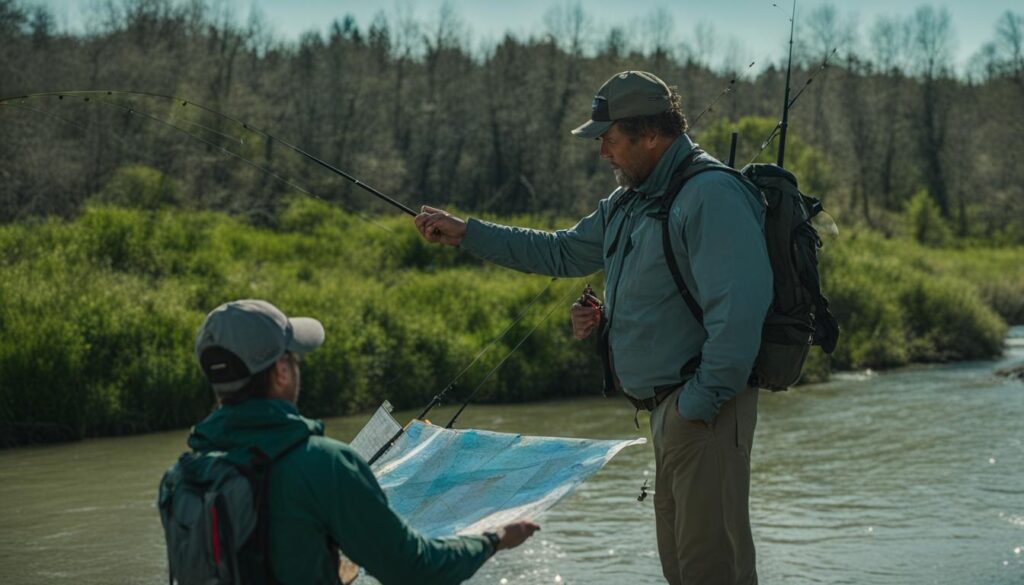
Value of Outfitter Insights and Pre-Trip Communication
Imagine having a compass that points to the most idyllic fishing spots — that’s what local outfitter insights offer. Reaching out before your trip yields a wealth of knowledge from those who know the waters best. They’re in the business of ensuring that you know how to plan a fishing trip that aligns with local conditions and customs.
Remember, the conversations with your outfitters are more than mere transactions; they are exchanges of wisdom that set the scene for adventure.
Setting Realistic Expectations with Experienced Guides
There’s nothing quite as humbling as the unexpected turns of nature. Having an expert guide by your side helps to temper your anticipations with a dose of local reality. Whether it’s the climate’s impact on fish behavior or understanding the flux of the fishing landscape, experienced guides provide clarity. Their advice could be the difference between an ordinary trip and an unforgettable excursion.
Building Relationships for Exclusive Fishing Trip Tips
Cherish your interactions with local experts as these relationships can grant you access to the hidden gems of the fishing world. These personalized encounters can lead to exclusive tips and off-the-beaten-path locations that rarely see a fishing line. The rapport you build with local outfitters often pays dividends, granting you insider knowledge and enhancing your overall experience.
Your journey from the planning phase to the first cast is paved with diverse experiences. Appreciate the dialogue with those who will make your fishing trip remarkable, as the tips and stories they share can be as rich and vibrant as the waters you aim to explore.
Conclusion
As you prepare to set off on your much-anticipated journey, remember that your fishing travel planning is a testament to your dedication to the sport. It’s a meticulous process that, when executed well, offers you a clear path to the serene banks or bustling charter boats that await you. The checklist you’ve meticulously prepared is not just a list of items to pack—it’s the blueprint of your upcoming adventure.
Finalizing Your Fishing Trip Checklist
Each item on your fishing trip planning tips serves a purpose, each piece of gear a key to unlock the potential of your trip. But a checklist is more than gear; it’s ensuring your documentation is up to date, your licenses are in hand, and that you’re ready for whatever Mother Nature throws your way. With every trip, your checklist should evolve, growing from the essential fishing travel planning tips you’ve learned and the experiences you’ve cherished.
The Joys of Anticipation and Proper Preparation
The thrill of anticipation is a powerful force, fueling your desire to step out into the unknown with your line and lure. Proper preparation paves the way to these moments of joy, allowing you to immerse yourself fully in the fishing travel planning process. It’s the art of balancing excitement with readiness, knowing that you’ve left no stone unturned in planning your angling journey.
Embracing Flexibility and Adventure in Angling Travel
Even the best-laid plans must leave room for the unexpected—because, in the realm of angling travel, flexibility is often your most valuable asset. Embrace the spirit of adventure that beckons you to adapt to changing conditions and seize opportunities as they arise. In doing so, you not only enrich your fishing journey but also sculpt unforgettable memories. Let the adventure begin, and may your heart be light and your catch be bountiful.
FAQ
How do I research and choose the best fishing destinations for my trip?
Start by considering the type of fishing experience you want, whether it’s freshwater or saltwater, specific fish species, or a certain technique like fly fishing. Utilize online resources such as state-specific information, regional hatch charts, and weather conditions. Books and maps specific to your region of interest can also be valuable. Consider factors like accessibility, local regulations, and seasonal variations. For remote destinations, like the headwaters of the San Juan River, detailed research is particularly important to understand hatch patterns, streamflow, and potential wildlife encounters.
How should I plan my fishing trip during the off-season?
Utilize the off-season to thoroughly research your desired destination. This is the time to learn about local hatches, fishing regulations, and ideal fishing spots. If you’re a fly angler, it’s also the perfect opportunity to tie flies that are specific to the planned destination’s conditions. Developing a deeper understanding of the fisheries and anticipated climate during your target season will help you set realistic expectations and prepare adequately.
Why are local fishing regulations and access laws important when planning a fishing trip?
Knowing local regulations is crucial for a legal and stress-free fishing experience. Regulations can vary significantly by location, and respecting these rules helps protect fish populations and the environment. Furthermore, understanding access laws will help you determine where you are allowed to fish, particularly differentiating between public and private waters, as some states like Colorado have heavily regulated water access.
What resources can help me navigate public versus private waters?
State fisheries resource agency websites, such as Colorado’s official site, provide interactive Fishing Atlases and detailed maps that are invaluable for identifying which waters are public and how to access them. Subscription services like TroutRoutes can also be utilized for pinpointing legal access points to public waterways, helping you navigate the complexities of local fishing laws.
How do I select the right fishing gear for different environments?
Gear selection should reflect the environment and the fish species you’re targeting. Research the expected hatches and typical fish size at your destination to choose the appropriate tackle. Depending on the climate, you may also need to consider special gear for comfort and success, such as waders for cold water. Efficiency in packing is key, especially when traveling with baggage restrictions, and ensure you are familiar with using the gear you bring.
What are some efficient packing tips for traveling anglers?
Maximize space by packing multi-purpose clothing and compact gear. If you’re bringing multiple rods, consider a larger tube that can fit all of them or create your own DIY rod case. Prioritize essential items like safety gear and personal medication, and be mindful of baggage restrictions, especially if you’re traveling by bush plane or helicopter. Label all your equipment appropriately, and keep a detailed checklist so you don’t leave anything crucial behind.
When is the best time to book a guided fishing trip?
Booking a guided fishing trip should ideally occur after researching median stream flows, investigating dam generation schedules, and considering seasonal and industry-specific factors like tourism and peak fishing seasons. It’s often beneficial to connect with a local guide early on, as they can provide valuable insights into the best times for success, based on the species you’re targeting and the specific experience you seek.
How can I set realistic expectations and get the most out of my fishing trip?
Communication with local experts and qualified guides before your trip is very helpful in setting realistic expectations about fishing conditions and potential success. Use their extensive knowledge to adjust your plans, if necessary, and consider their advice when it comes to choosing the right equipment and tactics. Outfitters can also offer insights into less-traveled fishing spots that can offer a more unique and rewarding experience.
What should I include in my fishing trip checklist?
Your checklist should include legal documents like fishing licenses and permits, appropriate clothing for the climate, fishing gear tailored to the target species and conditions, first aid and safety equipment, personal medications, and travel documents. It’s also good to have a list of emergency contacts, including local outfitters, guides, and relevant authorities in the area you’ll be fishing in.
Why is flexibility important when on a fishing trip?
Weather and fishing conditions can change quickly and unpredictably. Being flexible allows you to adapt to these changing circumstances, maximizing your chances of a successful and enjoyable trip. Sometimes the best fishing experiences come from unexpected opportunities or changes in plans, so embracing a sense of adventure can greatly enhance your overall travel experience.
Source Links
- https://safariclub.org/tips-for-the-traveling-angler/
- https://www.yellowdogflyfishing.com/blogs/back-stage-pass/tips-saltwater-fly-fishing-trip
- https://www.thescientificflyangler.com/post/figuring-it-out-planning-a-fishing-trip
“As an Amazon Associate I earn from qualifying purchases.”
